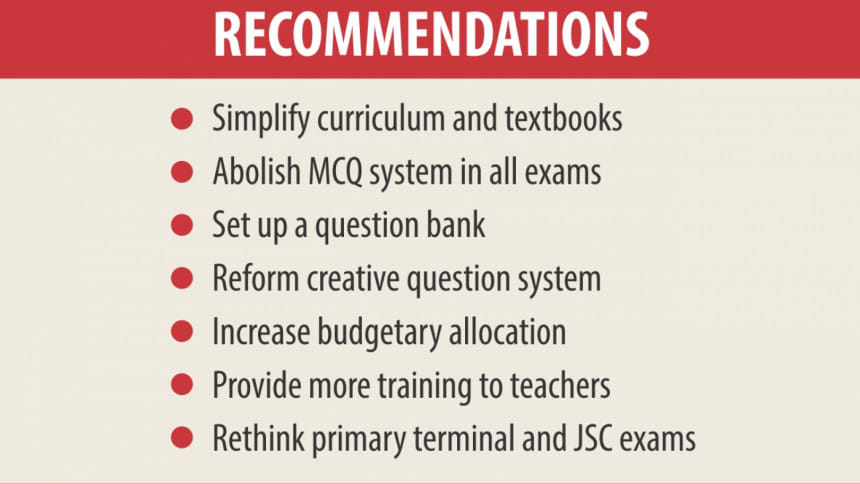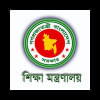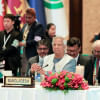Overhaul is the answer

Secondary school students are increasingly turning to guidebooks and private tuition due to heavy curriculum and complex textbooks, say leading academics and educationists.
The question papers of public examinations at secondary level are faulty and of low standard, they said at a view-exchange meeting yesterday.
They also suggested making the curriculum and textbooks simpler and imposing a total ban on notebooks and guidebooks.
The education ministry organised the meeting at the capital's CIRDAP auditorium with the objective of finding ways to improve the quality of secondary education.
Almost all participants advocated abolishing the multiple-choice question (MCQ) system in all examinations at the secondary level, saying students don't learn anything from it.
Pointing out that many teachers don't have the capability to prepare creative question papers, the educationists suggested the government rethink about the system introduced at this level in 2010.
Prof Abdullah Abu Sayeed, founder and chief executive of Bishwo Shahitto Kendro, said a number of schoolteachers still cannot prepare creative question papers by themselves and depend on guidebooks for that.
"It means we are returning to the notebook era."
He proposed creation of a question bank by experts for all subjects in secondary-level public exams so that the teachers' dependency on guidebooks diminishes gradually.
And if that happens, guardians would no longer need to take their children to private tutors, he said.
Referring to the high pass rate in public examinations, Prof Sayeed said the main objective of an exam is to test one's merit. “Otherwise, what is the need for an exam if everybody passes it?"
"Such a huge pass rate [in SSC] has called into question the entire education system ... People are losing faith in the system."
He suggested setting up libraries in all schools to help students get into the habit of reading.
Mohammed Farashuddin, former governor of Bangladesh Bank, said the curriculum of the secondary level is so huge that students don't learn anything properly.
"We need to make the curriculum nice," he said.
Turning to the MCQ system, he said the government should abolish it since students cannon gain any knowledge from it.
He also suggested introducing courses on English and a vocational subject at Qawmi madrasas.
Farashuddin said the government should reduce the gap between public exams and complete those within seven to 10 days.
Prof Md Akhtaruzzaman, a teacher of Islamic history and culture at Dhaka University, said, "We unnecessarily made the textbooks difficult by incorporating some chapters that are not essential for students. That is why they turn to private tuitions."
Echoing his view, eminent educationist and writer Prof Muhammed Zafar Iqbal said science textbooks are so difficult to fathom that even he struggled to understand many things while reading some of those.
"Textbooks should be written in such a way that a student doesn't need private tuition," he said.
Even if the teachers don't teach a student at school, he or she should not have any difficulty in understanding the subject by reading a textbook, he said.
Prof Zafar Iqbal said only good and expert writers should be commissioned to write textbooks in lucid language.
The question papers of public exams are of low standard and full of errors. "Good questions are a must for a good examination."
Teachers are the weakest part in the education system, he noted.
"Not only in schools or colleges, we are not getting good teachers even at the university level."
The country would not get good teachers until the budgetary allocation for the education sector is increased and the salaries of teachers are hiked.
He criticised newspapers for what he said was publishing "guidebooks" in their education pages every day.
Rights activist Sultana Kamal said many of the teachers at the primary and secondary levels came to the teaching profession, as they didn't get a chance to enter any other sector.
Teachers are left with no choice but to work on low salaries and the facilities they get are the lowest compared to those in any other profession.
They remain worried about their future all the time and think of doing something else to run their families. And this is where comes the issue of private tuition, she added.
"If we want to ensure quality education, we have to get good teachers. And for that to happen, investments in the education sector must be increased," said Sultana Kamal, also former adviser to a caretaker government.
She said it is not possible to get quality education with an allocation of only two percent of the GDP for this sector.
Rasheda K Choudhury, executive director of Campaign for Popular Education, said the government needs to rethink about the Primary Terminal and JSC examinations, as it not only increases students' dependency on coaching and private tuition but also disrupts the teaching and learning process at schools.
Qazi Kholiquzzaman Ahmad, chairman of Palli Karma-Sahayak Foundation (PKSF), said though the budgetary allocation for the education sector has increased over the years, its share in terms of percentage of the total outlay is actually decreasing.
"We need to increase the allocation for education," he said.
Educationist Prof Quazi Faruque Ahmed suggested forming a taskforce immediately for bringing reforms in the examinations and evaluation system at secondary level.
Education Minister Nurul Islam Nahid said his ministry would take its next course of action, keeping the educationists' suggestions in mind.
He said 10 marks would be reduced from the MCQ section of question papers from the next year.
Currently, 40 marks are allocated for MCQs and 60 marks for the written section in every subject.
Responding to the proposal for a question bank, Nahid said the government already decided to prepare a question bank with the help of experts.
"Education in the country has gone far in terms of number over the last five years. Now, we have to ensure quality education."
The minister said they would continue to provide training to teachers.
Education Secretary Sohorab Hossain presided over the meeting.
Additional Secretary (secondary education) Chowdhury Mufad Ahmed made a PowerPoint presentation highlighting the challenges.
The meeting was addressed by, among others, Dr Manzoor Ahmed, professor emeritus of BRAC University; Prof Siddiqur Rahman, former teacher at the Institute of Education and Research of Dhaka University; Prof Mohammad Kaikobad of Bangladesh University of Engineering and Technology; Prof Fahima Khatun, director general at the Directorate of Secondary and Higher Education; and educationist Shyamoli Nasrin Choudhury.

 For all latest news, follow The Daily Star's Google News channel.
For all latest news, follow The Daily Star's Google News channel. 








Comments